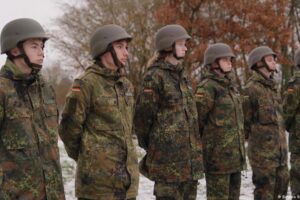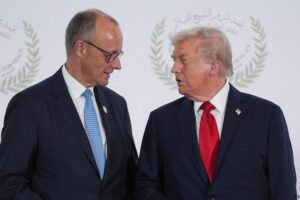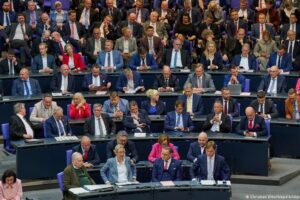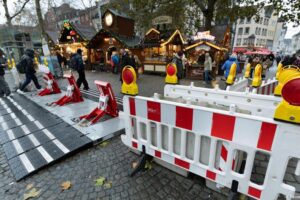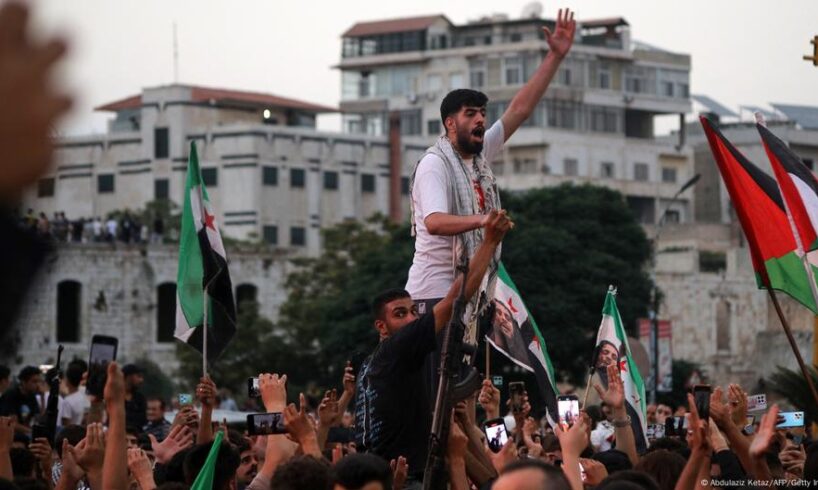
Even before the sun had risen on Thursday, Syrian President Ahmed al-Sharaa had already made several announcements on national television.
In a dawn speech, he said that the internal unrest between Sunni Bedouins and the Druze minority, resulting in the deaths of around 360 people in the southern province of Sweida, had ended. He also confirmed government forces were no longer deployed in the area.
Al-Sharaa then underscored his commitment to protect the rights and freedoms of the Druze community and reaffirmed their place in Syrian society.
But the main part of his speech was directed at Syria’s neighbor Israel.
This week, Israel launched attacks on Syrian government buildings in Damascus and Syrian troops in the Sweida region, resulting in the deaths of 20 people.
According to Israel’s Prime Minister Benjamin Netanyahu, the attacks were necessary “to save our Druze brothers and to eliminate the gangs of the regime.”
Yet, in al-Sharaa’s view, Israel was only exploiting the unrest by targeting civilian infrastructure and seeking to derail peace and reconstruction efforts in his country.
“We, the people of Syria, know very well who is trying to drag us into war and who is working to divide us,” al-Sharaa said, adding that “we will not give them the opportunity to entangle our people in a war that serves only to fragment our homeland and sow destruction.”
Israel said it was supporting Syria’s Druze community by targeting Syria’s defense ministry headquarters in DamascusImage: Ali Haj Suleiman/Getty Images
Expert: Israel’s modus operandi is ‘force’
The latest strikes on the Syrian capital mark an escalation of Israel’s military campaign in the country. Israel started bombing Syria much more frequently after the overthrow of the country’s dictator, Bashar Assad, in early December 2024, ostensibly to ensure that Assad’s weapons didn’t fall into the hands of the new government.
According to Charles Lister, head of the Washington-based Middle East Institute’s Syria initiative, Israel has carried out just under 1,000 strikes on Syria, and occupied 180 square kilometers of the country since December 2025. Lister notes that Syria’s government has not retaliated at all.
Officially, the countries have been at war since 1967. That year, Israel occupied Syria’s Golan Heights, a strategic plateau at the border, and then effectively annexed it in 1981. However the international community regards the Golan Heights as Syrian territory under Israeli military occupation. The US and Israel recognize the territory as Israeli.
After Assad’s fall, Israeli troops have moved beyond a demilitarized zone along the Israel-Syria border that’s been monitored by the United Nations since a 1974 ceasefire deal between the two countries.
“Israel is trying to carve out an informal buffer zone in southern Syria,” Ryan Bohl, senior Middle East and North African analyst at the US-based security intelligence firm Rane Network told news agency Bloomberg this week.
Earlier in March, Israel’s Netanyahu said Syria’s south must be a demilitarized zone.
“The recent strikes are a message to the government in Damascus that Israel follows with interest and concern what is happening in Syria,” Yossi Mekelberg, a professor of international relations at London’s Regent’s University, told DW. “One of the problems with the current Israeli government is that its only modus operandi is using force,” he added.
Israeli strikes on Syria: Israeli Prime Minister Benjamin Netanyahu is facing increasing domestic and international pressureImage: Khalil Ashawi/REUTERS
Timing of Israeli strikes key
“There is pressure in Israel to protect the Druze, as there is a long and deep-rooted alliance between the Druze and Jews in Israel,” Mekelberg said.
In Israel, the Druze are a community of around 150,000. Druze men regularly serve in the Israeli military.
In Syria, around 700,000 Druze make up one of Syria’s largest minorities.
But it’s been suggested that the timing of Israel’s strikes on Syria this week was also key. On Wednesday, Netanyahu had to appear in court as part of his ongoing corruption trial. His coalition government has also become increasingly fragile after two parties left it earlier this month. This could lead to general elections at the beginning of 2026.
Netanyahu has also been under increasing pressure by the US and European states to end the war in Gaza and is faced with calls for the return of the hostages still held by Gaza-based militant group Hamas, which is classified as a terrorist group by the US and many other countries. And Netanyahu is dealing with domestic and international condemnation for the humanitarian catastrophe in Gaza as a result of Israel’s ongoing military campaign there.
“Considering Netanyahu’s show of unabated cynicism and opportunism he could be using situations [such as the clashes involving Syria’s Druze minority] to deflect from his legal affairs and the crisis within his coalition,” Mekelberg said. “Keeping at least one front open and portraying himself, despite October 7, as ‘Mr. Security,’ especially when he might contemplate early general elections, is the way that he has always operated.”
Next week the Israeli parliament goes on summer break which will pause domestic politics until October.
Observers doubt that Syrian President Ahmad al-Sharaa could protect the Druze minority Image: Ali Haj Suleiman/Getty Images
Israel wants Syria to be weak
Israel’s other objective is for Syria to be a very weak state or to be a broken state so that it is unable to threaten Israel, the Rane Network’s Bohl told Bloomberg.
This seems to be happening, says Nanar Hawach, senior Syria analyst at the think tank International Crisis Group.
“Damascus came out weakened from the recent clashes, it was forced to retreat militarily [and] it lost the trust of not only the Druze community but also of different communities that are not aligned with the state,” he told DW.
In his view, Syria is now even more fragile. “Damascus also lost geopolitically as the government has now less presence in the south, especially in Sweida,” he said.
He doubts that Syria’s interim president Ahmad al-Sharaa could keep his promise and protect the Druze minority.
“It seems to be more a political gesture than a credible guarantee,” Hawach said, explaining that government forces were seen as siding with anti-Druze militias and there were credible reports of some units abusing Druze civilians.
“Unless Damascus reforms its security approach and holds its forces accountable, it will struggle to convince the Druze, or other minority communities, that it can genuinely ensure their safety,” he concluded.
Syrian leader al-Sharaa promises to protect Druze community
To view this video please enable JavaScript, and consider upgrading to a web browser that supports HTML5 video
Edited by: Cathrin Schaer
